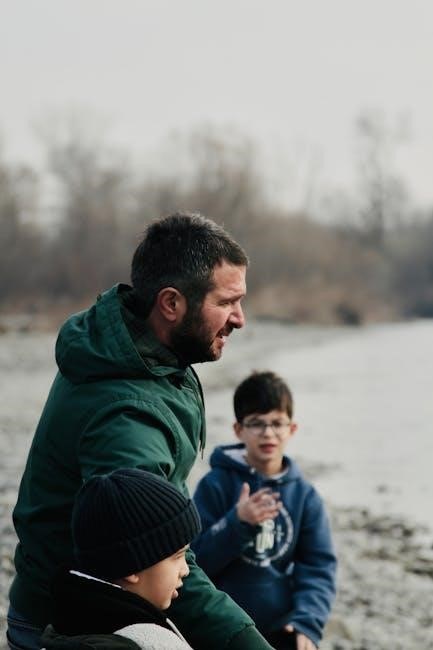All My Sons PDF: An In-Depth Analysis
Dive into Arthur Miller’s “All My Sons” with a comprehensive PDF analysis. Explore the play’s intricate plot, character motivations, and underlying themes of guilt, responsibility, and family loyalty. Uncover the tragic structure and moral conflicts within Miller’s post-war American masterpiece.
Arthur Miller and the Context of All My Sons

Arthur Miller, a prominent figure in American drama, penned “All My Sons” amidst a vibrant theatrical landscape, drawing inspiration from Greek tragedy and Chekhov’s dramatic realism. Wilder’s “Our Town” influenced Miller’s portrayal of everyday life. “All My Sons,” Miller’s first significant play, explores guilt and responsibility, focusing on Joe Keller, a manufacturer of war materials. The play’s themes resonate with the post-World War II era, questioning success and its human cost in a capitalist society. Miller’s work reflects the anxieties and moral complexities of a nation grappling with the aftermath of war. He delves into the ethical dilemmas faced by individuals in times of conflict. This also shows the struggle of finding a place in a world that is constantly changing after great conflict. The play examines the tension between personal ambition and social responsibility. It also demonstrates Miller’s keen understanding of the human condition. He presents a powerful critique of American values and the pursuit of the American Dream.
Plot Summary of All My Sons

“All My Sons,” set post-World War II, revolves around Joe Keller, his wife Kate, and son Chris. The story begins with a storm that fells Larry’s memorial tree. Larry, their other son, is missing in action. Chris intends to propose to Ann Deever, Larry’s former girlfriend. Ann’s father, Steve, is in jail for shipping defective airplane parts. Joe was acquitted, but suspicion lingers.
Ann’s brother, George, arrives, convinced of Joe’s guilt. Kate insists Larry is alive, but Ann reveals Larry’s suicide letter. The letter reveals that Larry killed himself out of shame. Chris confronts Joe, who finally admits his involvement. Joe, realizing the depth of his actions and their consequences, understands that the dead pilots were, in a moral sense, “all his sons.” Overcome with guilt and remorse, he commits suicide; This leaves Chris and Kate to confront the devastating consequences of Joe’s choices and the shattered remains of their family.
Character Analysis: Joe Keller
Joe Keller, the patriarch of the Keller family, is a complex character driven by a desire for success and security. He is a successful businessman who owns a manufacturing plant that supplied airplane parts during World War II. He makes a fateful decision to ship defective parts, leading to the deaths of twenty-one pilots. He avoids taking responsibility by shifting the blame onto his partner, Steve Deever.
Keller is a flawed man, motivated by a distorted sense of family loyalty. He believes his actions were justified to protect his business and provide for his family. He is charismatic and well-liked in the community, which allows him to maintain a facade of innocence. However, as the play progresses, his guilt and denial are gradually exposed. Ultimately, Joe confronts the devastating consequences of his choices and takes his own life, acknowledging his role in the tragedy. His character embodies the moral compromises made in pursuit of the American Dream.
Character Analysis: Kate Keller
Kate Keller, Joe’s wife and mother to Chris and the missing Larry, is a character defined by denial and unwavering hope. She refuses to accept Larry’s death, clinging to the belief that he is still alive. This denial is a coping mechanism to shield herself from the truth of Joe’s involvement in the defective airplane parts scandal, because if Larry is dead, then Joe killed him.
Kate is deeply superstitious, interpreting events as signs related to Larry’s fate. Her insistence on Larry’s return puts a strain on her relationship with Chris, who wants to move on and marry Ann Deever. Kate is also a master manipulator, using emotional tactics to control those around her and maintain her version of reality. While she appears fragile, Kate possesses a strong will and a fierce protectiveness towards her family. Ultimately, she is forced to confront the truth, shattering her carefully constructed world.

Character Analysis: Chris Keller
Chris Keller is the idealistic son of Joe and Kate, haunted by his experiences in World War II. Unlike his father, Chris possesses a strong moral compass and a deep sense of guilt for surviving the war while others perished. He struggles with the knowledge that his family’s wealth was built on potentially unethical practices.
Chris is in love with Ann Deever, Larry’s former girlfriend, and desires to marry her, which creates tension with his mother, who refuses to believe Larry is dead. He grapples with his father’s actions and the potential consequences for his family. Chris represents the younger generation’s disillusionment with the older generation’s compromises. His idealism clashes with the harsh realities of his family’s past. Ultimately, Chris is forced to confront his father’s guilt and make a difficult decision that tests his loyalty and values, leading to a personal crisis and a reevaluation of his beliefs.
The Theme of Guilt and Responsibility
Guilt and responsibility are central themes in “All My Sons,” permeating every aspect of the play. Joe Keller’s decision to ship defective airplane parts during the war leads to the death of numerous pilots, burdening him with immense guilt. He attempts to justify his actions by claiming he did it for his family, but this does not alleviate his moral culpability.
Kate Keller is also burdened by guilt, as she refuses to accept Larry’s death, clinging to the hope that he is still alive. Chris Keller grapples with survivor’s guilt, questioning why he lived while others died in the war. Ann Deever carries the weight of her father’s imprisonment, which stems from Joe’s actions. The play explores the consequences of shirking responsibility and the devastating impact of guilt on individuals and families. Ultimately, the characters are forced to confront their past actions and accept the consequences of their choices.
The Theme of Family Loyalty
Family loyalty is a complex and multifaceted theme explored in Arthur Miller’s “All My Sons.” The play questions the extent to which one should prioritize family obligations over moral and ethical considerations. Joe Keller’s actions are driven by a desire to protect his family’s financial security, leading him to make a devastating decision with tragic consequences.
Kate Keller’s unwavering loyalty to her son Larry, even after years of his disappearance, blinds her to the truth and prevents the family from moving forward. Chris Keller struggles with his loyalty to his father, grappling with the knowledge of his father’s guilt and the impact it has on his own sense of morality. The play examines the tension between familial bonds and individual conscience, highlighting the challenges of maintaining loyalty when faced with difficult choices. Ultimately, “All My Sons” suggests that true loyalty should be rooted in honesty and integrity, even when it requires confronting uncomfortable truths.
The Play’s Tragic Structure
“All My Sons” adheres to the classic structure of a Greek tragedy, characterized by a gradual unraveling of truth and a devastating downfall. The play begins with an apparent sense of normalcy, but the arrival of Ann Deever sets in motion a series of events that expose the dark secrets of the past. The rising action builds as tensions escalate, culminating in a climactic confrontation between Chris and Joe Keller. The revelation of Larry’s letter serves as the turning point, confirming Joe’s guilt and shattering the family’s illusions.
The falling action leads to Joe’s tragic suicide, a consequence of his actions and the weight of his guilt. The play’s resolution leaves the remaining characters grappling with the aftermath of the tragedy, highlighting the enduring impact of past sins. Miller masterfully employs dramatic irony, allowing the audience to anticipate the impending doom while the characters remain largely unaware. This heightens the sense of tragedy and underscores the play’s exploration of universal themes such as guilt, responsibility, and the destructive power of secrets;

Moral and Ethical Conflicts in All My Sons
Arthur Miller’s “All My Sons” is a crucible of moral and ethical conflicts, primarily revolving around Joe Keller’s decision to ship defective airplane parts during World War II. This act, driven by a desire for financial gain and the perceived need to protect his family, resulted in the deaths of twenty-one pilots. The play explores the tension between individual responsibility and loyalty to family, questioning whether personal gain can ever justify compromising ethical principles.
Joe’s rationalization of his actions, claiming he did it for his family, clashes with Chris’s idealistic view of morality and his belief in universal responsibility. Kate, Joe’s wife, is entangled in her own moral conflict, clinging to the belief that her son Larry is still alive to avoid confronting the truth of Joe’s guilt and its devastating consequences. Ann Deever also faces a moral dilemma, torn between her love for Chris and her obligation to reveal the truth about Joe’s involvement in her brother’s death. The play ultimately challenges the audience to consider the complexities of moral decision-making and the far-reaching consequences of unethical choices.
All My Sons: A Reflection of Post-War America
“All My Sons” serves as a powerful reflection of post-war America, grappling with themes of guilt, disillusionment, and the moral compromises made in the pursuit of the American Dream. Set in the aftermath of World War II, the play explores the psychological and ethical fallout of a society eager to return to normalcy and prosperity. The play examines the dark underbelly of wartime profiteering and the lengths to which individuals and corporations would go to maximize profits, even at the expense of human lives.
The Keller family’s struggle to reconcile their personal desires with their moral obligations mirrors the broader societal tension between individual ambition and collective responsibility. The disillusionment experienced by Chris Keller, a war veteran who idealistically believes in sacrifice and integrity, reflects the growing cynicism among many Americans who witnessed the corruption and moral ambiguity of the war effort. Miller’s play challenges the idealized image of post-war America, exposing the hidden costs of success and the enduring scars of conflict.


